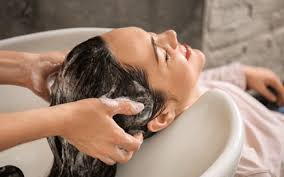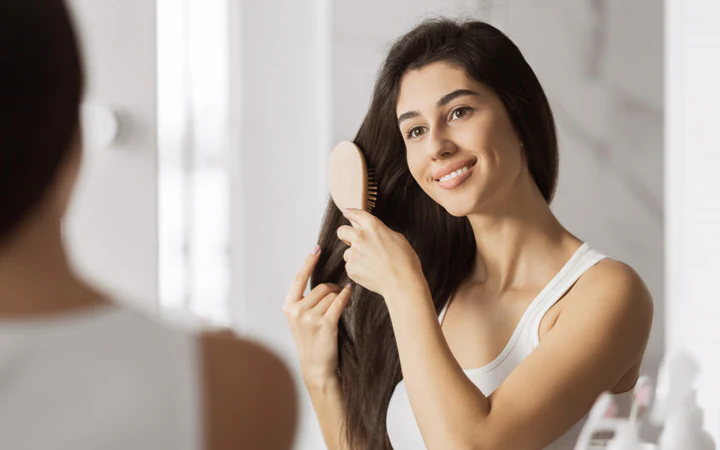Frustrated with lacklustre hair? Natural hair shampoo might be your solution. More people are embracing clean beauty, recognising its potential to transform their locks. However, navigating ingredient lists can be daunting. Don’t worry – we’ve got you covered.
This guide breaks down key components, empowering you to choose wisely. Whether you’re battling dryness, taming curls, or soothing your scalp, the right natural hair shampoo awaits. Your healthiest hair is just a wash away.
The Rise of Natural Hair Care
Natural hair shampoos are on the rise as consumers embrace sustainability and wellness. Brands are responding to this shift, crafting products free from harsh chemicals. Sulphates, parabens, and silicones – once common ingredients – are now avoided. These additives can strip hair’s natural oils, cause buildup, and gradually damage locks. As awareness grows, people are choosing gentler alternatives for their personal care routines. This trend reflects a broader move towards healthier, more eco-conscious living.
Natural shampoos offer a safer, more nourishing alternative to conventional products. But with countless options available, how do you choose? The key lies in understanding ingredients. Beneficial plant-based components can transform your hair care routine. Meanwhile, certain additives are best avoided. By focusing on these crucial elements, you’ll navigate the natural hair shampoo market with ease. Make an informed decision that aligns with your hair’s needs and your values.
Understanding Common Ingredients in Natural Hair Shampoo
When you grab a hair shampoo bottle, you’ll see a long ingredient list. The trick is to identify beneficial ones and avoid harmful ones. Here’s a rundown of common natural ingredients and their benefits for your hair.

1. Aloe Vera
Soothing scalps and fostering hair health, aloe vera shines in natural shampoos. This wonder plant balances pH levels, easing dandruff and irritation. Its enzymes revive dead skin cells, paving the way for stronger, lusher locks.
2. Coconut Oil
Coconut oil penetrates deeply, nourishing strands with fatty acids and vitamins. It halts protein loss, reducing breakage and boosting strength. As a result, hair becomes more resilient and manageable. The oil’s moisturising properties combat dryness, while its mild antibacterial action promotes scalp health. Finally, coconut oil imparts a radiant shine, transforming lacklustre locks into vibrant tresses.
3. Tea Tree Oil
Tea tree oil fights fungal and bacterial invaders, purifying your scalp. But it doesn’t stop there. By stimulating blood flow, it nourishes hair follicles, promoting healthier growth. The result? A cleaner, calmer scalp and stronger, more vibrant hair.
4. Argan Oil
Morocco’s “liquid gold” argan oil elevates natural shampoos. Rich in antioxidants, fatty acids, and vitamin E, it deeply moisturises hair. This nourishing elixir penetrates each strand, taming frizz and boosting shine.
5. Essential Oils
Essential oils like lavender, rosemary, and peppermint infuse natural hair shampoos with more than just fragrance. Rosemary stimulates growth, while peppermint invigorates the scalp and boosts circulation.
Ingredients to Avoid in a Natural Hair Shampoo
Knowing good ingredients is key, but avoiding certain things in shampoo is vital. Many regular shampoos have harmful chemicals. These can cause more damage than benefit. Here are the main offenders:

1. Sulphates
Sulphates, like sodium lauryl sulphate (SLS) and sodium laureth sulphate (SLES), are common in shampoos for lather. However, they can strip natural oils from the scalp and hair, causing dryness and irritation. Over time, they may damage hair follicles and lead to thinning hair.
2. Parabens
Parabens are used as common preservatives in personal care products like shampoos. They extend shelf life but are linked to hormonal imbalances and might disrupt the endocrine system. Conversely, natural shampoos use alternatives such as natural preservatives or essential oils, avoiding harmful side effects.
3. Silicones
Silicones like dimethicone are common in shampoos for added smoothness and shine. However, they can accumulate on hair, making it greasy and dull. Additionally, silicones create a barrier that blocks moisture and nutrients, leading to dry, brittle hair.
4. Artificial Fragrances and Dyes
Synthetic scents and colors can irritate the scalp and skin, especially for people with sensitive skin or allergies. They offer no real benefit to hair. These additives are mainly for visual or scent appeal. In contrast, natural shampoos use essential oils for fragrance and avoid unnecessary dyes.
How to Choose the Best Natural Shampoo for Your Hair Type
Now that you know the basics of natural hair shampoo ingredients, how do you choose the right one for your hair type?
- For Dry or Damaged Hair
Dry, brittle hair disrupts your style. But moisturising shampoos offer a simple solution. Infused with coconut oil, shea butter, or argan oil, these formulas hydrate, strengthen, and soften.
- For Oily Hair
Balance oily scalps with shampoos containing tea tree oil, rosemary, or peppermint. These ingredients regulate sebum production while keeping hair moisturised and healthy.
- For Curly Hair
Moisture-rich shampoos are crucial for curly locks. Look for formulas containing aloe vera, argan oil, or jojoba oil.
- For Sensitive Scalps
Look for calming ingredients: chamomile, aloe vera, and calendula. These nature-derived soothers fight inflammation, itch, and flakes, leaving your scalp calm and comfortable.
Final Thoughts
Embrace a healthier hair care routine with natural shampoos. These plant-based formulas nourish your locks while supporting sustainable beauty practices. By selecting ingredients tailored to your hair type, you’ll avoid harmful chemicals and enhance your hair’s health. The right natural hair shampoo not only benefits you but also the environment, fostering ethical beauty choices. Understanding key components ensures you find the perfect match for your hair, promoting both personal well-being and eco-conscious living.

Jean Smith is a fitness enthusiast and blogger who focuses on fitness and a healthy lifestyle. She is passionate about assisting people in living healthier lifestyles and is constantly on the lookout for new and creative methods to stay fit and healthy. Her articles are excellent resources for anyone interested in improving their health and fitness.
